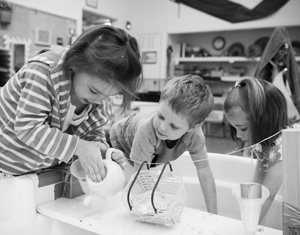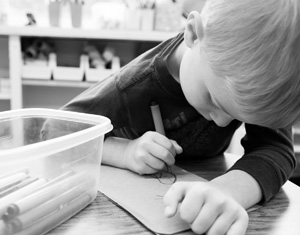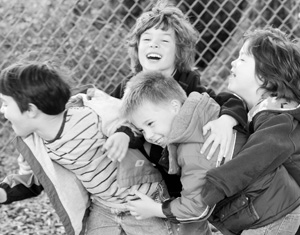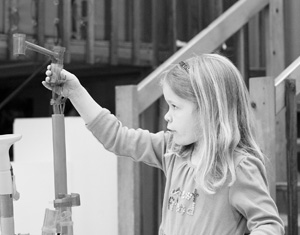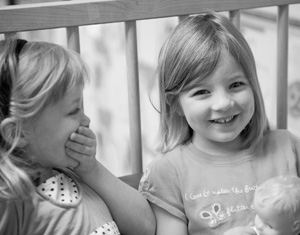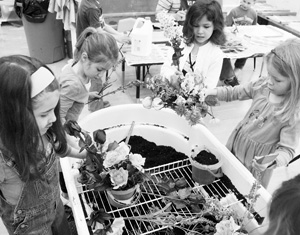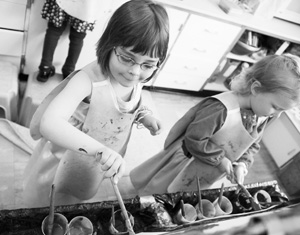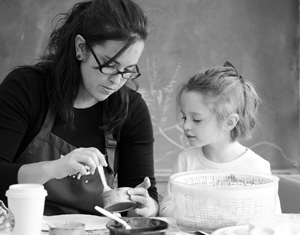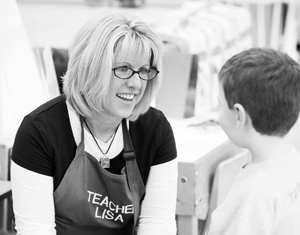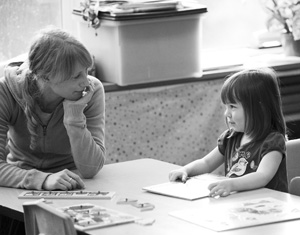A few things about our preschool…
What we do in class & classroom helper tasks
-
9:00 am – Open Exploration & Play
(Facilitate your table activity) -
10:30 am – Clean up
(Help us clean up the room) -
10:40 am – Group Time
(Disinfect tables, set out snacks, put away stray toys) -
10:50 am – Wash Hands/Snack Time
(Supervise handwashing / have snacks) -
11:15 am – Group Time
(Wash & dry dishes, disinfect tables, clean art supplies, sweep the floor) -
11:35 am – Recess
(Help supervise outside) -
11:55 am – Closing Song/Dismissal
Parent Responsibilities:
Volunteering in the classroom is a condition of preschool enrollment and is not optional. Only a parent or a designated helper may fulfill this obligation. Parents help in our preschool classrooms 1 to 2 days each month for the entire class session and provide a snack for that day. Teachers are responsible for all planning and activity preparation. We ask that you arrive 5 minutes early on your parent-help days so that you have time to find out what activity you will be doing and are ready to begin as soon as children enter the classroom. Our goal is to include you in such a way that you feel comfortable with what you are doing and can enjoy interacting with the children while you are with us.
Preschool families are also required to participate on one committee (making playdough, working in the garden, assisting with laundry, creating a photo album, etc.) for a total of approximately one hour each month.
Committee Descriptions:
Committee assignments are valuable contributions to the quality of Small Friends. Parents are expected to participate in one committee’s activities. Below is a list of the committees with their descriptions. You will be assigned one work committee. The time commitment expected is about 1 hour a month outside of class time.
ART COMMITTEE
This committee will be given resources from Small Friends or use their own materials to create visual aids for stories. Members will be given occasional activity preparation materials and/or assist teachers in displaying children’s art.
PLAYDOUGH COMMITTEE
Members of this committee will in turn be responsible for making batches of playdough or other clay-like recipes for our use in class. You will provide the ingredients for the dough. These are few and inexpensive. You may use the school watercolors and/or Cream of Tartar available for your use. The schedule will be on a 2 week rotation.
BOOK CLUB COMMITTEE
Members of this committee will re-shelve books that are pulled for use in the classroom. One parent will coordinate the schedule so that everyone is responsible for a given week/month (whatever works). This can be done while your child is in school or afterwards.
CONES
Members of this committee set cones out on our playground before the preschool sessions begin and put them away when the sessions are over each day. Each member will be responsible for setting them out OR picking them up one day each week.
HOSPITALITY COMMITTEE
Members of this committee are the behind the scenes parents that pick up the small tasks for our classroom celebrations. They would have one task for each event; such as setting up and putting away chairs, providing refreshments (punch and cookies), manning the refreshment table, cleaning up, etc. This makes it possible for everyone to have time to enjoy the event. There are 4 events throughout the year: Ice Cream Social, Winter Program, Information Night and Promotion Day.
SEWING COMMITTEE
For those who love to sew, this is a wonderful opportunity to do some light sewing projects that benefit the school. Generally the members make various dress-ups for the children and, occasionally, other items such as some curtains for various storage areas or story props. Any costs incurred for materials are reimbursed by the school.
PHOTO & ALBUM COMMITTEE
This committee is for those who would like to take photos of various special occasions such as Halloween, Back to School Night, etc. The school provides the film, camera, film development and other supplies. If you choose to use your own camera, costs will be your own responsibility. A parent from each class takes pictures and creates a simple photo album of 8-10 pages, double sided. The materials are provided for the photo album.
IN-ROOM TASKS COMMITTEE
This committee’s assignments vary by class and room. A parent from each class may be involved taking home and laundering paint smocks and towels, etc. so these things can be clean for next weeks morning class. Members may help feed and care for the various classroom pets by cleaning cages, cleaning fish tanks, getting crickets etc.
SUBSTITUTE TEACHER
This is for parents who would be willing to be called to come in as a substitute teacher on days when a teacher is absent, sometimes on short notice. You would not have curriculum responsibilities, but will participate with classroom management, supervision of children and other teacher responsibilities. You need to have alternative care for any siblings and you need to be available on the days that your child is in preschool. This committee is for those who enjoy being in their child’s classroom, who have available childcare for siblings, and a flexible schedule on short notice.
GARDEN COMMITTEE
Members of this committee will share in weeding and maintaining the outside garden areas used for planting and class projects. Three 3-hour Saturday work sessions are scheduled throughout the year. The school will provide any materials needed. Both parents are expected to come to the work day – children are all welcome.
Some common FAQ’s
The foundation of our curriculum is based on the value of relationship, language, play and investigations. We use the guidelines established by the National Association for the Education of Young Children as the backbone of our efforts. We see children as active meaning-makers who learn best through direct interaction, exploration, investigation and play. Materials and activities are selected based on their appeal to children and their potential for open-ended exploration. Our emphasis is on process rather than product and we view our role in the classroom as careful observers and active listeners who respond to children’s natural curiosity and interests. We do not have a predetermined set of curriculum goals that we present at scheduled intervals throughout the school year. Rather, we work with individual children, responding to them as they demonstrate readiness.
Our goals for children as they leave our program are that they see themselves as capable learners, that they know their ideas have value and that their voices are important. We want them to love learning and to approach new experiences with confidence and enthusiasm. We want them to have age-appropriate self-control and know how to manage themselves in a variety of social situations. We want them to handle transitions well and be self-directed. We want them to LOVE coming to school! These have been our goals for over 20 years and we consistently hear from families and kindergarten teachers that children transition well to elementary school and experience great success.
We expect toddlers to act like toddlers – and that includes everything from hugging to hitting. A significant part of preschool is learning to communicate and interact successfully with peers. We find that the most effective way to help children develop these skills is to model, model, model and practice, practice, practice! When we observe children having difficulty, we enter the situation and work with them, giving them specific language to try and supporting them in their attempts. We have rules in our classrooms and expect a certain level of age-appropriate behavior, but understand that developing self-control and learning to “use their words” is a process that takes place over time. We do not use time-outs, as we do not feel they equip children with new, more appropriate skills.
However, if a child becomes so frustrated or upset that s/he cannot effectively negotiate or try a different approach, we will redirect the child, moving with him/her to an alternative activity so s/he can gain control. If appropriate, we may sit with the child on a bench in the hall until s/he is ready to reenter the classroom. We maintain frequent, open communication with families and recognize that collaboration and mutual support are essential in assisting children with their behavior.
No. Although parent helping is a condition of enrollment, parents do not have any administrative responsibilities. The total number of hours spent in the classroom or on committee projects are significantly less than they are in most co-ops.
It really does “take a village.” Having parents in our classrooms creates a community where children can experience a variety of rich relationships. They see adults working together and learn to be comfortable with a variety of people. As the school year progresses, parents get to know each other and many form friendships that last well beyond the preschool years. Being able to come into the classroom and see your child “in action” and to experience his/her life at school is a much deeper experience than just hearing about it through newsletters or in conversations after the fact. We like to maintain class sizes of 15 – 18 because we feel it creates an ideal social situation and increases the likelihood that children will establish meaningful connections with those who share their interests. Having 2 teachers along with 2-3 parents insures that children get essential adult interaction and support as well.
No. We ask that parents find alternative care on the days they are scheduled to help so that they can be fully present in our classrooms.
WE DO NOT DO ANY MANDATORY FUNDRAISING! Small Friends is funded entirely through registration and tuition fees.
We assume that children will be potty trained by the start of school.
In our experience, children who are not at all interested in potty training are typically not developmentally ready to handle many of the routines and social situations at preschool, and would benefit from an additional year before enrolling. However, we also understand that each child is different and there are always exceptions! If your child is not successfully using the toilet please but you think s/he is ready for preschool, please discuss with our teaching staff.
We use a waitlist because it is the fairest way to keep track of enrollment. However, its length can be misleading and we find that once we have gone through the names (some of which have been on it for years) and eliminated those who have moved or who’s circumstances have changed, we are able to place everyone who wants to enroll.
Our teachers all teach both a younger and an older class and we assume that children will stay with them for both years. Being with the same teachers and classmates provides consistency and strengthens the sense of community in each class. However, at the end of the first year, parents may request a change and we honor those requests whenever possible.

